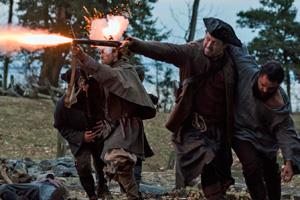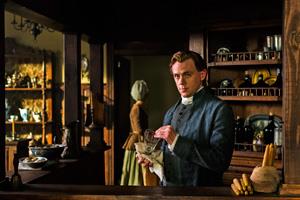Much like the period it depicts, Turn: Washington’s Spies defied the odds to last as long as it did — four seasons, 40 episodes in all.
With just seven episodes to go — the new season began some 10 days ago, with a two-episode premiere on June 17 — Turn: Washington’s Spies is rushing towards its inevitable historical end: victory for the American Continental Army following the British surrender at Yorktown in 1781, the Treaty of Paris in 1783 and redemption for the Culper spy ring, formed in the summer of 1778 under the orders of then Gen. George Washington (Ian Kahn, top).
It’s a strange quirk of the TV business that studio publicity dries up for series in their final season, even audience favorites. It’s as if, with no future in front of it beyond the few remaining episodes that have yet to air, a retiring series is forgotten before it even has a chance to say its proper goodbyes. AMC has exiled Turn: Washington’s Spies to the wilderness of Saturday nights (9 p.m. ET), where the post-Civil War period western Hell on Wheels spun out its wheels last July, after five seasons and little more than 50 episodes.

And yet, despite stiff odds, Turn has proved oddly compelling in its final days. Addictive, even. Without a weepy romance to drive them, like Outlander, or the blood-and-guts thunder of pitched battle scenes on full display in Game of Thrones and its ilk, costume dramas are often a tough sell with a mainstream audience. And yet Turn somehow managed to hold our interest — at least, mine anyway — through coiled tension and the ever-present threat of a wider conflict, coupled with the sexual tension of romance thwarted by historical events.
The American War of Independence has always proved a tough nut for the big screen to crack; in a strange way, it seems more ideally suited for the small screen. Around the time British filmmaker Hugh Hudson, fresh off a Best Picture Oscar for Chariots of Fire, tackled the Revolutionary War in Revolution, a famously misbegotten box office flop starring Al Pacino as an American patriot and Donald Sutherland as a bent British officer with a predilection for abusing young war conscripts. One leading critic at the time noted that the problem with the Revolutionary War is that there were no all-summoning, defining battles, as there were in the Civil War. While the Civil War gave the big screen Gone with the Wind and Shenandoah, the best the Revolutionary War could come up with was The Scarlet Coat, Johnny Tremain and The Howards of Virginia. Roland Emmerich, fresh off his sci-fi smash Independence Day, gave it a shot in the year 2000 with The Patriot — Mel Gibson, ladies and gentlemen! — but while The Patriot was not as woeful as Revolution, it was no Gone with the Wind.

And yet, the very thing that makes the American Revolutionary War a tough nut to crack for the big screen — too many incidents, spread over too much distance over too many years, with no single, defining beginning, middle or end — is the very thing that makes it suited for cable television, with its novelistic approach to storytelling. Cable dramas are stories best told in short, 10-episode seasons that tell a larger, overarching story in its own good time, with characters who are allowed to breathe, grow and move around of their own accord.
AMC and series creator Craig Silverstein were wise enough to spot that key ingredient where even Oscar-winning filmmakers fell short. Turn’s source material was a book, historian Alexander Rose’s Washington’s Spies: The Story of America’s First Spy Ring, but it took TV producers familiar with the visual medium to see its possibilities as a TV drama.
And while no one will confuse Turn with Game of Thrones for sheer epic storytelling, what a satisfying TV drama it has proven to be.
The dialogue can be clunky at times, and the acting wooden (but enough about George Washington’s teeth). But then there are moments when the language soars, whether it’s “the lobster” — an uncharitable name for the British officer class — Lt. Col. John Simcoe (Appropriate Adult’s Samuel Roukin, right, warbling menace in an oily sing-song voice) confronting a suspect, “For a loyalist, it seems you have a checkered history; do you admit your crimes?” only to be told they were not crimes but, “follies, youthful indiscretions.”
Above all, the American War of Independence was a war of sacrifice. And sacrifice — sacrifice of self, sacrifice of family, all in the service of a greater cause — is Turn’s stock and trade.
“It is difficult to measure sacrifice,” the loyalist spy and Philadelphia barman Robert Townsend (character actor Nick Westrate, above, middle) told Simcoe, in this past week’s episode. “Often it seems to me that it is a road without end.”
“Of course there’s an end,” Simcoe replied. “The end is death.”
There are moments in Turn so awkward and stilted on occasion they seem like rubbing salt-pepper in open wounds, but much like the Revolutionary War itself, Turn’s whole outmeasures the sum of its parts.
Recalling his British-officer father’s fate in the Black Hole of Calcutta, this, after trying to stand up for oppressed subjects of the British crown, Simcoe says, “One cannot speak truth to power if power has no use for truth.”
Them’s fightin’ words.
And just think — this is from Turn’s resident villain, not one of its heroes.
Turn will not win any of the big TV awards, final season or no. When its time comes, though — likely in mid-August — it will be missed. In my household, anyway.